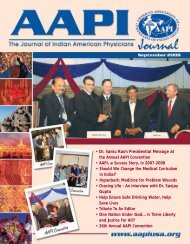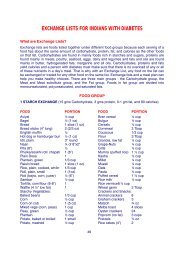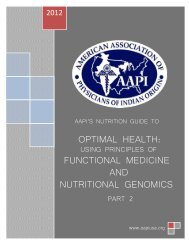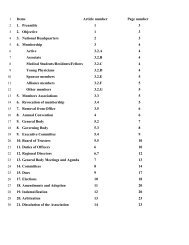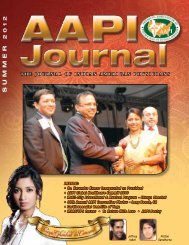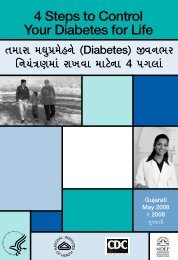functional medicine and nutritional genomics - American Association ...
functional medicine and nutritional genomics - American Association ...
functional medicine and nutritional genomics - American Association ...
You also want an ePaper? Increase the reach of your titles
YUMPU automatically turns print PDFs into web optimized ePapers that Google loves.
AAPI’S NUTRITION GUIDE TO OPTIMAL HEALTH: USING PRINCIPLES OF FUNCTIONAL MEDICINE AND NUTRITIONAL GENOMICS<br />
Elimination Problems – One of the most common<br />
GI symptoms children with autism have is chronic<br />
constipation. Research confirms that constipation<br />
is more common in children with autism than other<br />
children (65). Abdominal X-rays of children with<br />
<strong>and</strong> without autism who are experiencing stomach<br />
pain has shown that autistic children have a<br />
significantly higher rate of excess stool in the<br />
colon. Children with chronic constipation often<br />
associate bowel movements with pain <strong>and</strong><br />
deliberately hold in their stool to avoid a bowel<br />
movement. Due to holding in their stool, over time<br />
the child will no longer recognize or respond to<br />
the urge to have a bowel movement which<br />
exacerbates the constipation. If the child is<br />
experiencing chronic constipation, he will feel<br />
uncomfortable <strong>and</strong> may even be feeling severe<br />
pain. These children may express their pain as<br />
behavioral <strong>and</strong> feeding problems. Chronic<br />
constipation can also result in physical issues such<br />
as megacolon <strong>and</strong> encopresis.<br />
On the other end of the spectrum, some children<br />
with autism also tend to have problems with<br />
chronic diarrhea, loose stools, non-formed stools,<br />
or a combination of all three at different times.<br />
Many parents describe their child as never having<br />
had a normally-formed stool. Chronic diarrhea is<br />
diarrhea that is present for more than three weeks<br />
<strong>and</strong> is not associated with an illness. Many<br />
medical professionals refer to it as chronic nonspecific<br />
diarrhea (CNSD). If a child with CNSD<br />
continues to gain weight <strong>and</strong> grow taller at a<br />
normal rate, many medical professionals do not<br />
consider it a significant health problem or suggest<br />
any specific medical treatment to resolve the bowel<br />
issue. Parents, however, are usually very<br />
concerned about their child’s abnormal loose stools<br />
<strong>and</strong> rightly so. If the child with autism is having<br />
difficulty controlling his bowel function, it will<br />
impact him in many ways. For instance, having<br />
chronic diarrhea, loose stools, <strong>and</strong>/or non-formed<br />
stools will affect his ability to potty train, forcing<br />
parents <strong>and</strong> other caregivers to continue changing<br />
diapers beyond the typical age. The child’s bowel<br />
issues may make him feel uncomfortable which will<br />
affect his sensory system <strong>and</strong> can lead to<br />
behavioral problems. He may also encounter<br />
<strong>nutritional</strong> deficiencies because chronic diarrhea<br />
125<br />
causes malabsorption of vitamins, minerals, <strong>and</strong><br />
other nutrients. This impedes his body’s ability to<br />
repair the lining of the GI tract, which only serves<br />
to exacerbate his malabsorption of nutrients. This<br />
vicious cycle of chronic diarrhea, malabsorption,<br />
<strong>and</strong> nutrient deficiencies can compromise the<br />
child’s overall health, brain function, <strong>and</strong> behavior.<br />
The Gut - Behavior Connection - Undiagnosed<br />
gut problems can cause serious behavioral<br />
problems in children with autism, particularly those<br />
who are unable to verbally express the pain they<br />
are feeling. If a child is nonverbal, he may<br />
communicate how he feels through his behavior.<br />
Unfortunately, too often these symptoms are<br />
dismissed as ‚typical‛ autistic behaviors as<br />
opposed to attempts to communicate what the<br />
child can not put into words. Identifying <strong>and</strong><br />
correcting the child’s gastrointestinal disorder will<br />
lead to significant improvement in his behavior.<br />
A child with gut problems may suffer from one or<br />
more the follow symptoms:<br />
� Gastrointestinal symptoms - reflux,<br />
vomiting, abdominal pain, bloating,<br />
flatulence, loose stool, diarrhea,<br />
constipation, infrequent stool, straining to<br />
pass stool<br />
� Vocal behaviors - clearing of throat,<br />
screaming, sobbing, whining, moaning<br />
� Motor behaviors - facial grimacing, gritting<br />
teeth, grazing, mouthing on clothes,<br />
pacing, self-injury, jumping up <strong>and</strong> down,<br />
aggression, puts pressure on abdomen<br />
� Change in overall state - sleep<br />
disturbances, irritability, oppositional<br />
behavior<br />
� Mealtime behaviors - food refusal, limited<br />
variety of foods, mealtime tantrums,<br />
discontinue eating foods he used to eat<br />
Dietary Treatment of gastrointestinal symptoms<br />
Referral to a Registered Dietitian is important to<br />
educate parents on basic <strong>nutritional</strong> management<br />
of GI problems. Often basic <strong>nutritional</strong><br />
interventions will heal the child’s gut <strong>and</strong> resolve<br />
their GI symptoms.<br />
Step 1: Dietary Modifications<br />
2012






